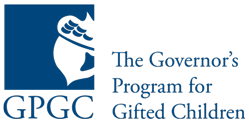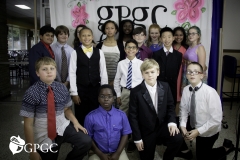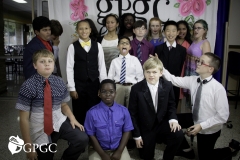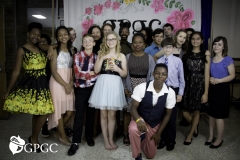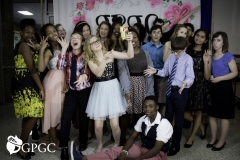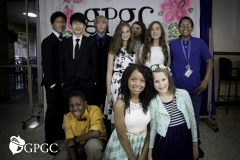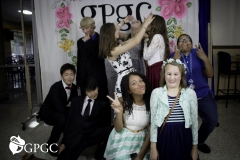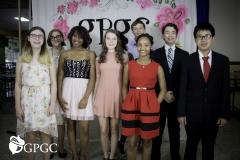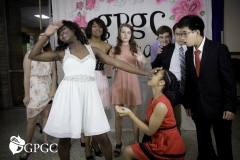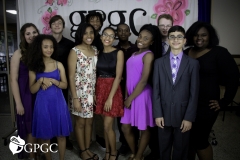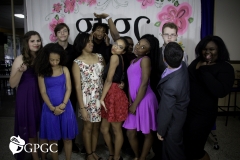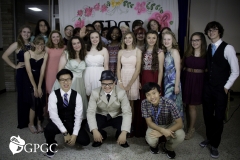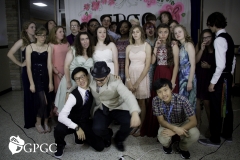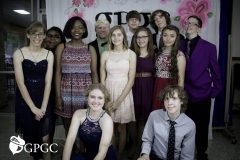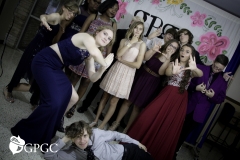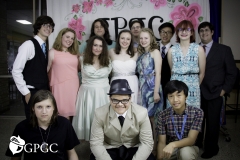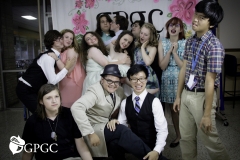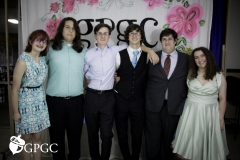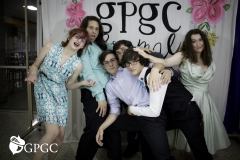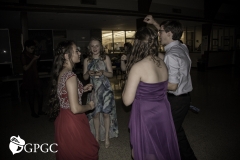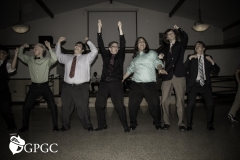Throughout the summer we will be posting weekly reports from the classes. Please let us know if there’s anything else you’d like to see or if you have any questions for specific instructors.
We are also posting regularly on Facebook. You don’t have to join Facebook to see our posts. The link is: https://www.facebook.com/gpgcla/
Freshmen (First Year) Classes:
Freshmen Science (Calvin Runnels, Instructor)
This week, we dove into more advanced topics in chemistry, especially polarity and how it affects the properties of different materials. We used experiments involving oobleck (a non-newtonian fluid), and paper chromatography to animate these concepts in a way the kids found engaging and intuitive. We also took a detour into biology, discussing natural selection, mutations, genetic drift, and the central dogma of molecular biology (the relationships among DNA, RNA and protein). On top of that, we “cooked” eggs in different kinds of alcohols, imploded soda cans, and put balloons to the test on a bed of nails!
Freshman Composition (Reese Menefee, Instructor)
Students were introduced to creative non-fiction this week. They read, discussed, and analyzed essays before working on their CNF pieces in class.
Monday: The class was introduced to creative non-fiction as a genre. The class read, analyzed, and discussed “Peacock” by Aimee Nezhukumatathil. After reading, the class participated in an in-class writing activity where they were asked to apply a memory of home to each one of their five senses.
Tuesday: The class read, discussed, and analyzed “The Jacket” by Gary Soto. We continued discussing creative non-fiction. Students were asked to respond to an in-class writing prompt centered around a meaningful object in their lives.
Wednesday: The class continued to analyze and discuss creative nonfiction. We went over the instructions for their creative nonfiction piece that is due on Monday. Students had time to begin working on their CNF pieces in class.
Thursday and Friday : Students worked on typing their CNF pieces in the library. They were able to ask questions and receive feedback if they wanted.
Freshmen Humanities (Christine Bertrand, Instructor)
This week the students in Humanities I concluded our study of persuasive techniques and fallacies used in attempts to persuade audiences. Students evaluated their peers’ use of rhetorical devices in application letters by anonymously voting on which applicants they would include in their zombie apocalypse survival camp. We’ve now begun a brief overview of the development of civilization beginning in the Fertile Crescent of Mesopotamia and expanding around the entire Mediterranean region. This historical context will lay the foundation for our study and discussion during Week 4 of the Greek philosophers and their influence on western civilization.
Graduate Classes:
Grad Psychology (Dr. Linda Brannon, Instructor)
The topic this week in psychology class was mental disorders as well as some information about treatment and the effectiveness of treatment.
Monday’s discussion focused on characteristics of mental disorders, such as distressing changes in behavior, socially unacceptable behaviors, etc. We also discussed the Diagnostic and Statistical Manual of Mental Disorders, which is the document that specifies criteria for diagnosing mental disorders. I explained how the term “insanity” is not a psychiatric or psychological term but rather a legal one.
Tuesday’s topic was Anxiety Disorders, which include phobias, panic disorder and panic attack, and agoraphobia (and how it can be extensively debilitating).
We also began a discussion of depression and how dangerous depression can be, with its connection to suicide. We also discussed bipolar disorder (manic-depression) and how that disorder is different from how most people and can be difficult to live with, live around, and even difficult to treat.
On Wednesday, we talked about schizophrenia. Point that I wanted to convey included how seriously debilitating schizophrenia can be and the personal and social problems that often happen to people with schizophrenia. Also, I wanted to impress the students with the difference in behaviors for people with schizophrenia and the media image, which associated schizophrenia with violence. That stereotype is incorrect.
On Thursday, we began class with our weekly quiz on the topics we discussed over the week. We continued to talk about the difficulties of living with obsessive-compulsive disorder and also some of the treatments for the disorders we discussed this week.
On Friday, we looked at movie clips of portrayal of mental disorders, and students critiqued the accuracy of these portrayals.
Conflict and Diplomacy (Jessica Markstrom, Instructor)
This week covered concepts including bargaining, crisis escalation, negotiation, and deterrence. The evaluation of negotiations and deterrence included students reading excerpts from chapters 4, 5, and 6 from Arms and Influence as well as chapters 8 and 9 from Force and Statecraft. These chapters included problems facing long terms disarmament and the potential issues facing states who desire to deescalate a standoff between major powers. On Friday students continued the state development project. While some students want to create a peace treaty, other students are engaging in other forms of limited conflict.
Graduate Creative Writing (Reese Menefee, Instructor)
Students were introduced to poetry this week!
Monday: Introduction to poetry! The class was introduced to lyric poetry and narrative poetry. The class read, analyzed, and discussed an excerpt from Madness, Rack, and Honey by Mary Ruefle. In addition to examining a craft essay, students read and discussed “Road Trip” by Andrea Cohen, “July” by Cristin O’Keefe Aptowicz, and “In Blackwater Woods” by Mary Oliver.
Tuesday: The class continued to discuss poetic form and structure. Students were introduced to epistolary poems and persona poems. The class read, analyzed, and discussed “Mushrooms” by Sylvia Plath, “Love Song of the Demogorgon” by Jenny Molberg, and “Letter to N.Y.” by Elizabeth Bishop. Students wrote their own persona poems and had the opportunity to share at the end of class.
Wednesday: The class continued to discuss poetic form and structure. Students were introduced to abecedarians. Students read, analyzed, and discussed “Hummingbird Abecedarian” by Aimee Nezhukumatathil. Students wrote an abecedarian in class and had the opportunity to share their work at the end of class.
Thursday: The class continued to discuss poetic form and structure. Students were introduced to the golden shovel and the ode. Students listened to Gwendolyn Brooks read “We Real Cool” before reading “A Golden Shovel” by Terrance Hayes. We discussed the golden shovel form before reading “Ode to French Fries” by Pablo Neruda, “Ode to the Flute” by Ross Gay, and “Ode to the Mattress on the Side of the Interstate” by William Fargason. Students spent the end of class writing odes.
Friday: Free Write Friday! Students participated in a collaborative writing prompt and had the opportunity to share any writing from earlier in the week.
